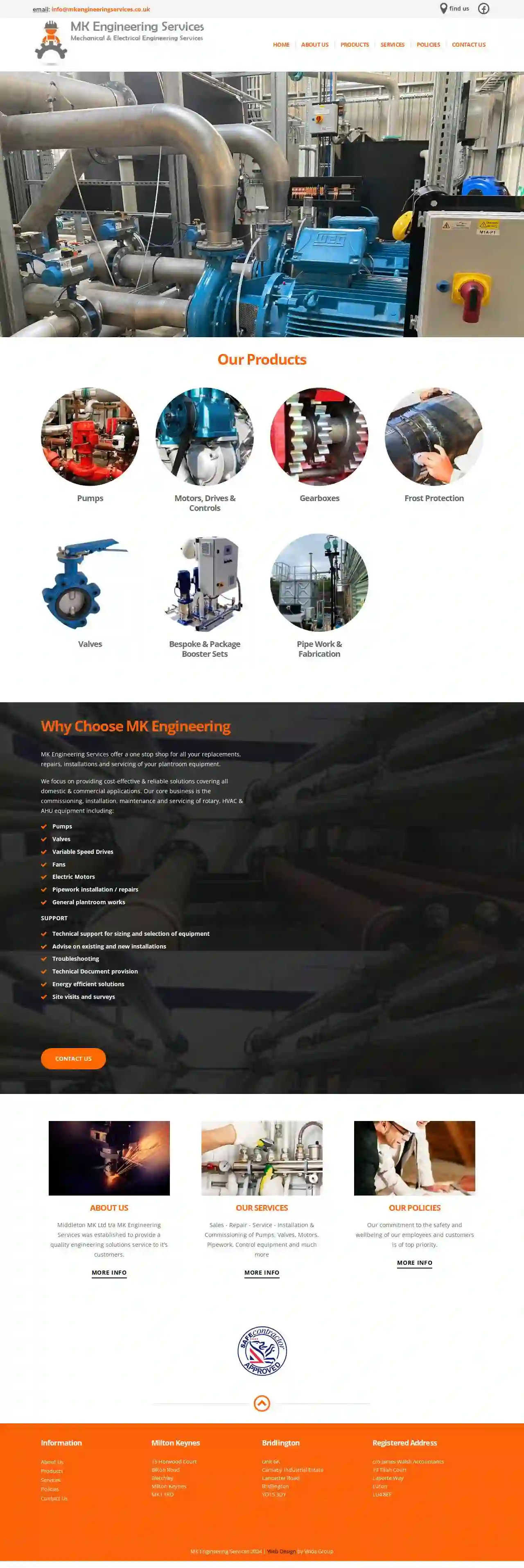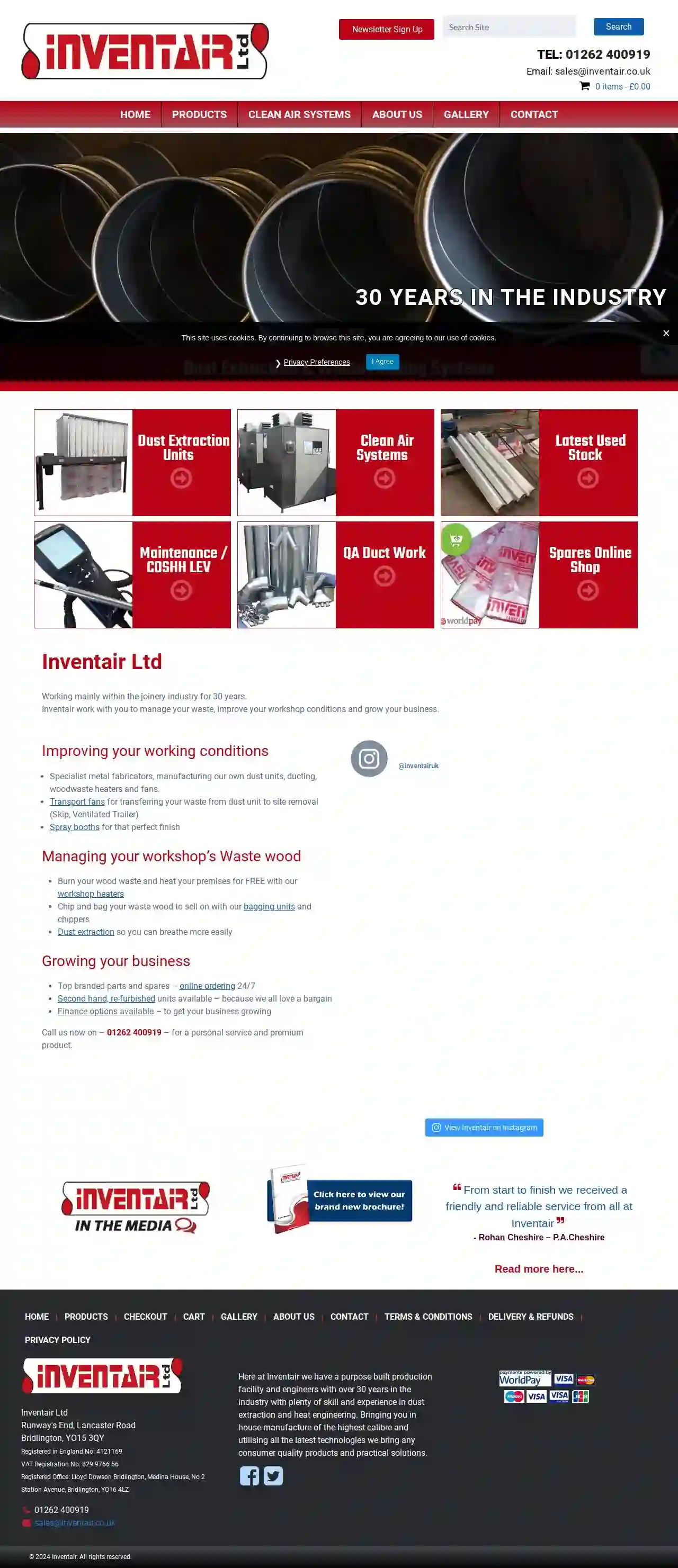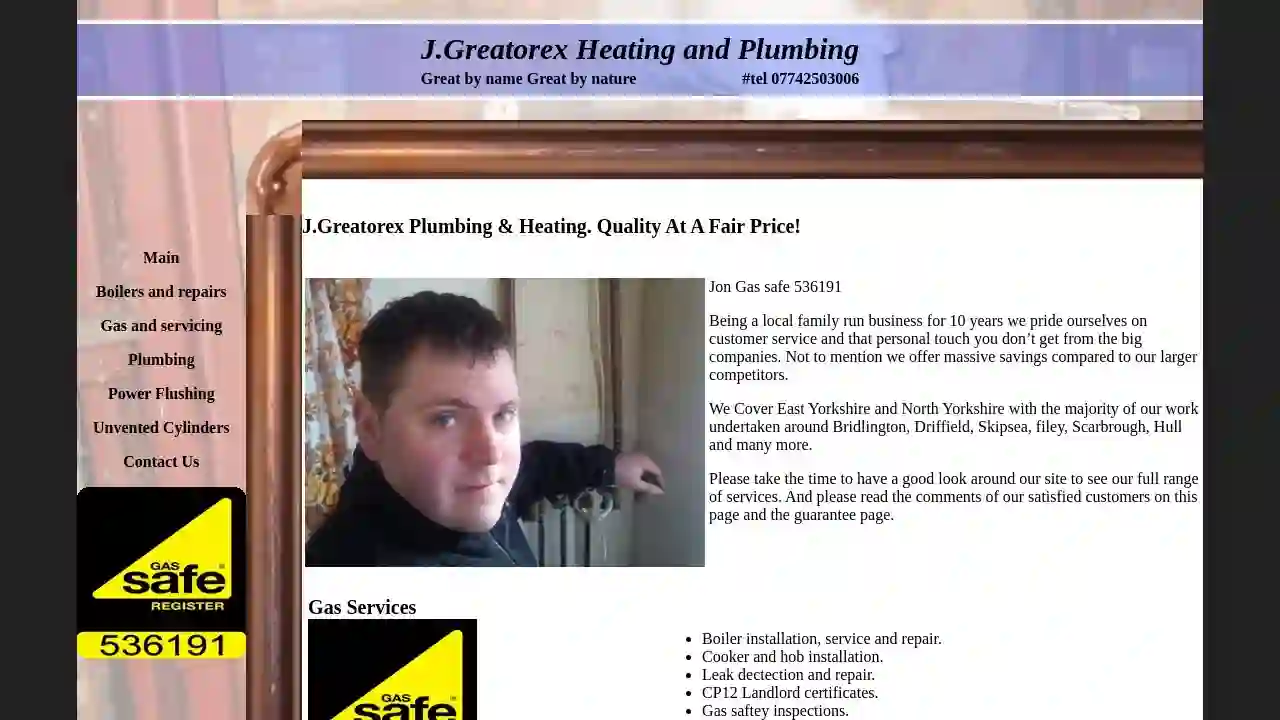Emergency HVAC Withernsea
Find 24/7 HVAC Repair in Withernsea
Get 3 FREE Emergency Furnace Repair quotes for your project today! Compare profiles, reviews, accreditations, portfolio, etc... and choose the best offer.

MK Engineering Services
15 Horwood Court, Bilton Road, 15 Horwood Court Bilton Road, Bletchley, MK1 1RD, GBMiddleton MK Ltd t/a MK Engineering Services was established in August 2009 by the current owners and was set up to provide a quality engineering solutions service to it's customers in a predominantly water, air handling and building services market specialising in rotating equipment i.e. pumps, motors, gearboxes, pressurisation units, hot and cold water circulating pumps, AHU's, FCU's etc.We are backed by our fully competent and trained workforce. We put the well being and health & safety of our clients, staff and suppliers at the forefront of our business therefore, all our staff undergo training and induction for their specific competencies and as a minimum hold relevant CSCS cards.The management and staff of MKES are committed to offering our valued customers the best possible service whether it's a simple supply of a product to repair of your equipment or an on-site installation or repair. We understand that non-working machinery costs money and will always endeavour to get our customers equipment back into operation as quickly and cost effectively as possible. There aren't many problems we can't solve or equipment we can't repair however, we will always discuss the job with you, keep you informed on the progress but more importantly try to eliminate the root cause of any failures so that it doesn't happenagain.We are a firm believer in 'customer service' and whether you are speaking to one of our site engineers or administration personnel over the phone, you will always be dealt with in a courteous and respectful manner.We pride ourselves in delivering top quality products and services and regard ourselves to be 'best in class'.Business sectors we currently deal withWater and Waste WaterFacility MaintenanceCouncilsHospitalsHotels and LeisureUniversitiesManufacturingFood & Beverage
- Services
- Why Us?
- Accreditations
- Gallery
Get Quote
Smith's Refrigeration
53 reviewsUnit C Enterprise Way Bessingby Industrial Estate, GBSmith's Refrigeration is a third-generation, family-run business located in the heart of the Yorkshire coast. With over 40 years' experience within the refrigeration and air conditioning industry, we are a trusted refrigeration, catering, and air conditioning business supporting companies for over a decade. Our services include refrigeration, air conditioning, and catering equipment sales, maintenance, and repairs. We pride ourselves on building strong relationships with our clients and providing a personal touch to our services.
- Services
- Why Us?
- Our Team
- Gallery
Get Quote
DS Gas Services plumbing & heating
56 reviews11 Ellerburn Drive, Bridlington, YO16 7QS, GBHi, welcome to DS Gas Services 07511635364 [email protected] DS Gas Services is a friendly and reliable plumbing and heating company in Bridlington. We offer gas services and central heating services to the residents of North Humberside and surrounding areas and have been doing so for many years. DS Gas Services have been providing the people of North Humberside with a wide range of customer focused plumbing and heating services for many years! DS Gas Services is a professional service. I’ve been proudly serving the Bridlington area and seen from minor leaks to boilers so damaged i was shocked they were still in service I can fix up all your gas & plumbing problems. DS Gas Services has created longstanding, trusting relationships with customers. Give me a call today. Free Estimates Appliance Services £60 At DS Gas Services in Bridlington we approach every job with attention to detail and excellent customer service. You can be confident that the job will be done right the first time around and with results that are guaranteed to last. Why choose DS Gas Services? We are confident that we can meet all your requirements on your next plumbing and heating project in Bridlington and also exceed your expectations when it comes to quality and affordable heating engineers in North Humberside. Great Rates & Quotes Here at DS Gas Services we strive to give all of our customers the best quotes we can, and constantly research our competitors so that we can keep doing so, time and time again. Are you looking for a plumbing and heating quote? Look no further! A Name You Can Rely On DS Gas Services are a company you can always rely on. We work constantly on improving our service so that our customers know they can trust us to carry out our work with little disruption to their daily lives. A Time Served Team All of our team are highly skilled in the plumbing and heating trade and have built up a wealth of experience over the last several years. No job is too demanding for us as we have all been trained to deal with every situation that the plumbing and heating trade can throw at us! Our Philosophy Our mission is to provide the residents of North Humberside with a no hassle plumbing and heating service where all work exceeds expectations, meets deadlines and offers excellent value for money. Contact us Contact us via the form below and we'll get right back to you... NAME EMAIL PHONE DESCRIBE NATURE OF JOB HERE Submit Thanks for getting in touch, we'll respond ASAP. Call us: T: 07511635364 Email us: E : [email protected] Our Location DS Gas Services 11 Ellerburn Drive Bridlington YO16 7QS ©2021 by DS Gas Services. SEO By Search Gurus Ltd
- Services
- Why Us?
- Gallery
Get Quote
Inventair Ltd
44 reviewsBridlington, Runway's End, Lancaster Road, YO15 3QY, GBInventair Ltd is a company with over 30 years of experience in the industry, working mainly within the joinery industry. We work with customers to manage their waste, improve their workshop conditions, and grow their business. Our products include dust extraction units, ducting, woodwaste heaters, and fans. We also offer refurbished units, finance options, and online ordering of spare parts. Our team is dedicated to providing a friendly and reliable service to our customers.
- Services
- Why Us?
- Testimonials
- Gallery
Get Quote
A. SMITH ELECTRICAL SERVICES LIMITED
51 reviewsUnit 46, Cranswick Industrial Estate, Driffield, YO25 9QE, GBWe are an electrical engineering company based in Hutton Cranswick, East Yorkshire. We are specialists in electrical machinery repairs (motors, generators and pumps), as well as offering general electrical contracting work (both commercial and domestic). We work with our industrial and commercial clients to achieve their end goal – providing cost-effective solutions to reduce downtime. We pride ourselves on our quick and efficient service. For a relatively young company we have an incredible 80 years or more of combined industry experience. So it’s unlikely you’ll have a problem that we won’t have come across before! We offer good, honest, reliable service – please browse our website to see what services we offer, or give us a call to discuss your requirements.
- Services
- Why Us?
- Gallery
Get Quote
Tim Allsop Motor Engineers Ltd
4.757 reviews29 St. Johns Street, Bridlington, YO16 7NL, GBWelcome to Tim Allsop Motor Engineers. We are a well established family run company founded in 1980 by Tim and Angela Allsop, who built up an enviable reputation for honesty and reliability in the Bridlington area. We pride ourselves in offering a friendly and personal service and compare favourably against Main Dealer prices and your Manufacturers warranty is unaffected by us servicing your car. We have the latest up to date equipment and qualified technicians and are a Bosch Car Service Centre which is a national network of independent garages backed by Bosch. As a member of the Bosch Car Service network and working to an TSI Approved Code of Practice our procedures and work undertaken meets a national standard and we are audited by the Retail Motor Industry on a regular basis. In early 2014, on the retirement of Tim and Angela, the company was acquired by their long serving technicians, Ian Coultas, Stuart Hales, and Steve Burnhill, who continue to run the company in the same friendly way, as it has been since 1980 History For the first year the business was run from a small workshop in the town centre, but since 1981 has operated from St Johns Street and has grown significantly now occupying almost one acre. In the early years Tim and Angela ran the business by themselves, but over the years, as the business expanded, more staff have been employed In 1995 we became a Class 4 MOT Testing Centre and 3 years later, as part of our continuing expansion, we took over the Park Garage business when the previous owners decided to emigrate. We were a Unipart Car Care Centre from 1995 to 1999 and received accredited awards every year. After this we were approached by Bosch to take part in a pilot scheme of only 8 garages in the country to trial the Bosch Care Service Network, which was real honour. We gained Bosch Quality Audit Certificates in 2006, 2009 and 2010 and with our help Bosch have now achieved a network of indepent garages totalling 500 in 2011. In early 2014, on the retirement of Tim and Angela, the company was acquired by their long serving technicians, Ian Coultas, Stuart Hales, and Steve Burnhill. Ian has over 44 years of experience working as a vehicle technician in the motor trade from leaving school at 16 he went to work at a Rover garage for 14 years, after that he came to Tim Allsop's and has been here ever since, You could say hes part of the furniture. Stuart has over 32 years as a vehcile technician in the motor trade and has been with the company for over 20 years. Steve has over 30 years experience in the motor trade and has been with the company for over 15 years.
- Services
- Why Us?
- Accreditations
- Our Team
- Testimonials
- Gallery
Get Quote
J Greatorex Plumbing & Heating
57 reviews123 Main Street, Hemel Hempstead, HP1 1AA, GBEstablished in 1995, JGPH is a leading provider of plumbing, heating, and electrical services in the UK. Our team of experienced professionals is dedicated to delivering high-quality solutions to residential and commercial clients. With a strong commitment to customer satisfaction, we strive to build long-term relationships with our customers. Our services include plumbing repairs, boiler installations, and electrical rewiring , among others. We are proud to be a Gas Safe Registered and NICEIC Approved company, ensuring the highest standards of workmanship and safety.
- Services
- Why Us?
- Accreditations
Get Quote- AB
ABR Heating
54 reviewsBridlington, GB- Services
- Why Us?
- Gallery
Get Quote - St
Steve Lilley Plumbing & Heating
3.77 reviewsBridlington, GB- Services
- Why Us?
Get Quote - Ja
Jamie Bunclark Heating and Cooling
4.25 reviewsBridlington, GB- Services
- Why Us?
Get Quote
Over 12,692+ HVAC Businesses onboarded
Our HVAC companies operate in Withernsea and surroundings!
HVACCompaniesHub has curated and vetted Top HVAC Businesses near Withernsea. Find a reliable pro today.
Frequently Asked Questions About Emergency HVAC Services
- A sulfurous odor
- Hissing or whistling sounds near gas lines or appliances
- Blowing dirt or bubbles in standing water
- Dead or discolored vegetation near gas lines
- Physical symptoms like dizziness, nausea, or headaches
How do I know if I have a gas leak?
How long does it take for an emergency HVAC technician to arrive?
What is carbon monoxide, and how can it affect my HVAC system?
How can I prevent future HVAC emergencies?
How do I know if I have a gas leak?
- A rotten egg smell odor
- Hissing or whistling sounds near gas lines or appliances
- Blowing dirt or bubbles in standing water
- Dead or discolored vegetation near gas lines
- Physical symptoms like dizziness, nausea, or headaches